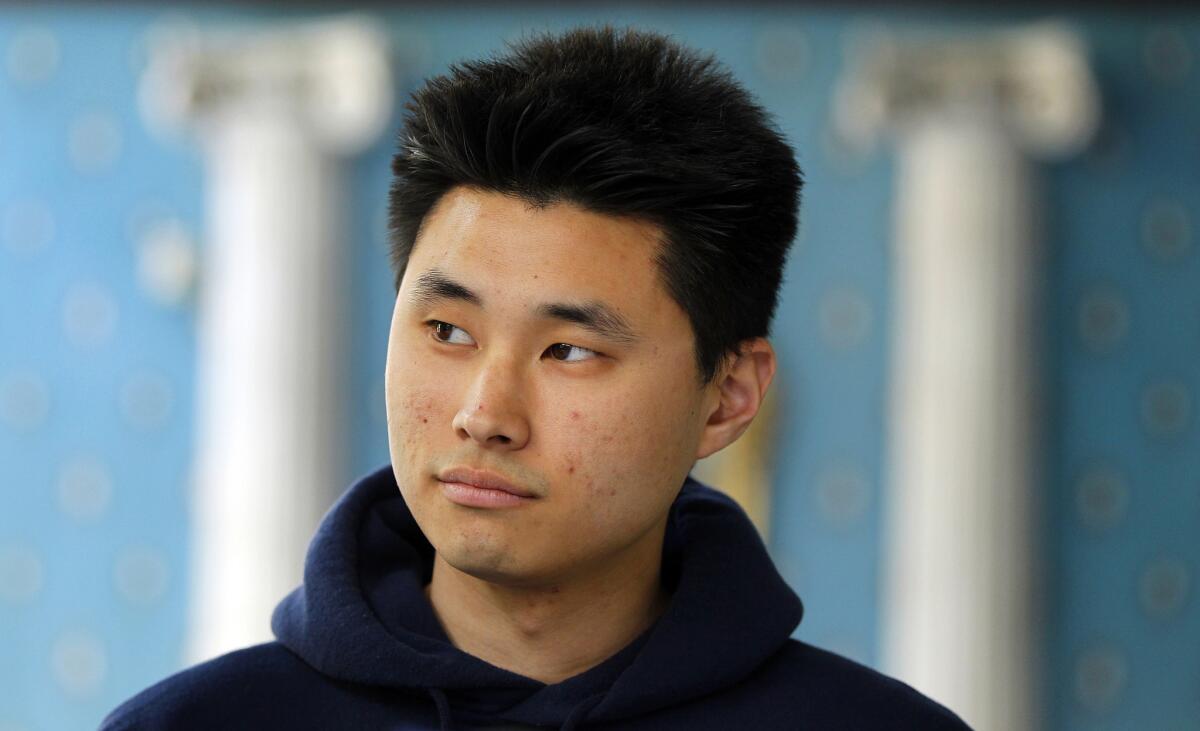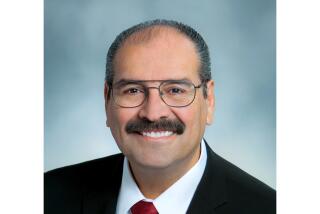Officials criticize DEA’s light punishment of agents who forgot man in cell for 5 days

Daniel Chong suffered post-traumatic stress disorder after being held in a cell for five days with no food or water.
Obama administration officials and lawmakers are calling for greater accountability and tougher disciplinary procedures at the Drug Enforcement Administration after the agency imposed only light punishments on agents who forgot a San Diego man in a holding cell, leaving him without food or water for five days and nearly killing him.
Daniel Chong, a UC San Diego student, was detained in 2012 for what he was told would be five minutes after he was swept up in a drug bust at a friend’s house, where he had been smoking marijuana. Instead, agents forgot about him. Chong, who was 23 at the time, drank his own urine to stave off dehydration until he was found, delirious and suffering from severe breathing problems, according to a report last summer by the Justice Department Office of the Inspector General.
After an internal DEA review concluded in March, the six DEA agents involved received only reprimands and short suspensions, spurring the Justice Department to demand reforms to prevent such mistakes from reoccurring.
In an April 28 letter to members of Congress obtained by the Los Angeles Times, the Justice Department said that what happened to Chong was “unacceptable” and that “the DEA’s failure to impose significant discipline on these employees further demonstrates the need for a systemic review of DEA’s disciplinary process.”
The DEA is already under fire for its handling of a scandal in which agents admitted frequenting prostitutes in Colombia. Complaints over DEA Administrator Michele Leonhart’s failure to adequately punish the agents in that case led to her early retirement announcement last month.
The incident over Chong is likely to factor in the search for her replacement. Administration officials said they would search for a new agency head who could beef up its internal disciplinary procedures and create a culture that would hold agents more accountable for their actions.
At the same time, several members of Congress — also concerned over the Chong case — have indicated they will move to give the next administrator more authority over civil service disciplinary rules, which DEA officials blamed for the light punishment in both cases.
Chong, who was never charged with a crime, was kept in total isolation with his hands handcuffed behind his back in a windowless cell with no bathroom. Midway through the ordeal, someone turned off the light in his cell, leaving him in darkness. Chong periodically shouted for help and, at some point, slipped out of one of his handcuffs.
After he was found, Chong was hospitalized for four days. He and his lawyers said at a news conference last summer that he underwent intensive therapy for post-traumatic stress disorder. The DEA paid Chong a $4.1-million settlement.
Last month, the DEA’s Board of Professional Conduct issued four reprimands to DEA agents involved in the incident and a five-day suspension without pay to another. The supervisor in charge at the time received a seven-day suspension.
Gene Iredale, a San Diego lawyer who represents Chong, said the punishments were insufficient.
“In a situation where someone goes over four days without food and water and almost dies, some reprimands and a couple of brief suspensions are not proportionate to the danger that was caused by this misconduct,” Iredale said. “I cannot accept that the head of the agency was powerless to ensure there would be appropriate punishment meted out. It may be that the regime of Miss Leonhart created a culture of unaccountability.”
Rusty Payne, a DEA spokesman, said the Justice Department inspector general’s investigation into the incident was referred to the agency’s Board of Professional Conduct, which recommended the punishments to a top independent official. Under current civil service regulations, the DEA administrator is not permitted to intervene in disciplinary matters.
But Payne said the institutional problems that led to Chong being forgotten in his cell had been fixed.
“It was a terrible, tragic mistake and one we have learned from, and we are going to make sure it doesn’t happen again,” he said.
Justice Department officials and lawmakers remain dissatisfied with the DEA’s handling of the matter.
“The Department of Justice has serious concerns about the adequacy of the discipline that DEA imposed on its employees,” spokesman Patrick Rodenbush said. Former Atty. Gen. Eric H. Holder Jr. ordered a review of DEA’s disciplinary procedures, Rodenbush said, and the department’s Office of Professional Responsibility “will make recommendations on how to improve the investigative and disciplinary processes for all allegations of misconduct at DEA.”
Senate Judiciary Committee Chairman Charles E. Grassley (R-Iowa) said Tuesday that the Justice Department letter did not address all his concerns about the incident.
“The Drug Enforcement Administration still has a lot of explaining to do,” Grassley said. “This is a very serious matter and questions should be answered to ensure a tragedy like this doesn’t happen again.”
Leonhart, under pressure from the Obama administration, announced April 21 that she was stepping down amid criticism over the Colombia scandal.
Seven DEA agents received suspensions ranging from two to 10 days for participating in sex parties with prostitutes while on assignment in Colombia, going back as far as 2001.
At a hearing in April, House members were incredulous at Leonhart’s testimony that she had no power to issue more serious punishments. The committee issued a bipartisan statement of “no confidence” in Leonhart’s leadership.
Twitter: @timphelpsLAT
More to Read
Start your day right
Sign up for Essential California for news, features and recommendations from the L.A. Times and beyond in your inbox six days a week.
You may occasionally receive promotional content from the Los Angeles Times.







